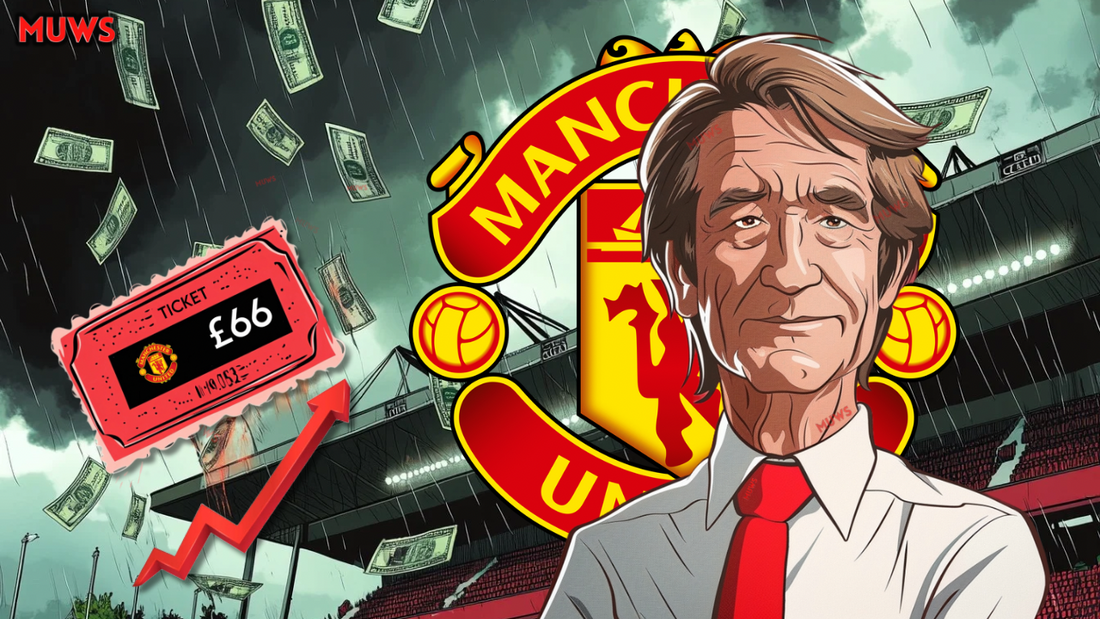
The History of Manchester United’s Ticket Prices
Share
The recent announcement by Sir Jim Ratcliffe, to increase Manchester United ticket prices to £66 for all adults and children, with no concessions, has ignited significant backlash from the fan base. To understand the frustration, it’s essential to trace the evolution of ticket prices at Old Trafford and their impact on the club’s supporters.
Early Days: Affordable Entertainment for All
In the 1960s, football was an affordable pastime for working-class communities. A standing ticket during the 1960-61 season cost just 12.5p, while seated options ranged from 17.5p to 32.5p. Season tickets were available for £7 to £8.50, offering fans excellent value. Even as Manchester United invested in their infrastructure, such as the construction of the North Stand in 1964, ticket prices remained relatively stable, reflecting the club’s ethos of accessibility.
By the late 1960s, inflation began to push prices upward. By the 1969-70 season, the most expensive matchday ticket cost 35p, while season tickets rose to £14.50. Though modest by modern standards, these increases foreshadowed the gradual shift away from football’s working-class roots.
The All-Seater Era and Premier League Expansion
The transformation of football stadiums into all-seater venues in the 1990s, spurred by safety regulations post-Hillsborough, resulted in a sharp rise in ticket prices. During the 1991-92 season, seated tickets ranged from £7.50 to £11, and season tickets reached £144.50 at the higher end. By the first Premier League season in 1992-93, prices climbed further, with season tickets hitting £266 for the most premium seats.
Manchester United’s dominance under Sir Alex Ferguson coincided with substantial investments in Old Trafford. From 1991 to 2000, the club spent over £90 million on stadium expansions, including new stands and executive boxes. These developments boosted the stadium’s capacity to over 62,000 but came at the expense of affordable pricing. By the 1999-2000 season, the cheapest matchday ticket was £16, and season tickets peaked at £428.

The Glazer Ownership and Fan Discontent
Following the Glazers’ contentious takeover in 2005, ticket prices increased rapidly. By the 2010s, matchday tickets exceeded £50, and the cost of season tickets surpassed £700. The rising prices led to widespread protests, with some supporters breaking away to form FC United of Manchester, a club committed to affordable football.
The 2023/24 Season: A Notable Shift
In 2023, Manchester United announced their first season ticket price increase in 11 years. Since 2012, the club had maintained a pricing freeze, keeping season ticket rates steady for 11 consecutive seasons. However, for the 2023/24 campaign, the freeze was lifted, marking a significant change for loyal supporters. The club justified the rise by citing growing operational costs, but many fans felt betrayed, as affordability has remained a key issue.
Ratcliffe’s Controversial Price Hike
Ratcliffe’s decision to set a flat rate of £66 per ticket, regardless of age or seating area, has exacerbated tensions. This change eliminates discounts for children, families, and other groups, making it one of the most divisive moves in recent memory. Fans argue this pricing model neglects the club’s working-class heritage and risks further alienating the community that built Manchester United’s global identity.
Balancing Heritage and Modernity
Manchester United has evolved into a global powerhouse, but the financial pressures of maintaining success have increasingly clashed with its roots. Ratcliffe’s decision symbolises the broader trend of football clubs prioritising commercial interests over fan loyalty. If the club continues down this path, it may secure short-term profits but risk losing the passionate support that has made it iconic.
The backlash against these price increases underscores the growing discontent among fans and raises important questions about the future of accessibility in football. Will clubs like Manchester United find a balance between tradition and modern business, or will the sport continue to drift further from its core supporters?
Note on real‑term costs: The historical ticket prices cited are in nominal terms and don’t reflect changes in the value of money over time. For context, the UK inflation rate has averaged around 5.1% per year since 1960, meaning prices have increased approximately 2,200% between 1960 and 2025. Notably, inflation peaked at nearly 27% in 1975, then surged again to over 10% in 2022 during the post‑pandemic cost‑of‑living crisis. As a result, a £70 season ticket in the early 1980s would cost around £300–£400 today after adjusting for inflation, while a £428 price in 2000 is closer to £750–£800 in current terms. Including these inflation‑adjusted figures offers a clearer view of how much more fans are genuinely paying.
A big thank you to all the Manchester United fans who helped piece together this ticket price history through their collections, matchday programmes, and memorabilia: your contributions were invaluable. Additional data points sourced from Statista.
